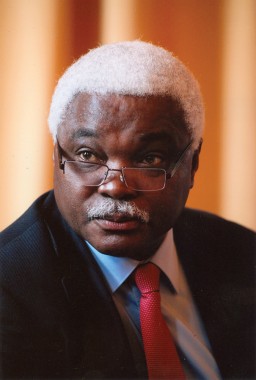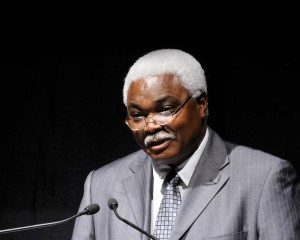
Cities Today talks to Jean-Pierre Elong Mbassi, Secretary General for UCLG Africa
28 February 2013
by Richard Forster
Interviewed prior to the Africities Summit held in Dakar, Senegal, December 2012
What role do you see for UCLG Africa in terms of the development of the continent?
The UCLG Africa vision was clearly articulated during the founding congress of our organisation in Tshwane, South Africa, in May 2005, as follows: “building the unity of Africa from, and promoting its development through, the grassroots”. At UCLG Africa we see the development of the continent springing up through each village and city so that the people of this continent are fully involved in and beneficiaries of any policy or strategy pertaining to the development and integration of Africa. Through sustainable local economic development and its contribution to the growth of local and national markets, local governments contribute to founding the development of the continent on the potentialities of African territories.
How many African cities are members of the organisation and how has the membership developed?
Our organisation has two types of active members: the national associations of local governments, and the direct city members. To date, active membership includes 40 national associations and 700 cities out of the 2,000 targeted cities. Through its membership our organisation represents 350 million African people.
With such a diverse number of cities, from the largest continent, how do you prioritise key issues?
UCLG Africa is a network organisation built on the subsidiarity principle. Apart from the headquarters hosted in the city of Rabat, Morocco, UCLG Africa works with regional offices located in each of the five regions of the continent as defined by the African Union. In so doing every regional context is duly taken on board, not forgetting of course the ultimate aim of uniting our continent from the grassroots. The five regional offices headed by a regional director are the following: Cairo, Egypt, for the North Africa Regional Office (NARO); Abuja, Nigeria, for the West Africa Regional Office (WARO); Yaounde, Cameroon, for the Central Africa Regional Office (CARO); Arusha, Tanzania, for the East Africa Regional Office (EALGA); Harare, Zimbabwe, for the Southern Africa Regional Office (SARO). The agenda setting of UCLG Africa stems from the priorities defined at the level of each national association and each region. The regions and national associations are also the implementing agents of UCLG Africa activities, with the secretariat only playing the role of a one-stop shop for fund raising and capacity development, advocacy and lobbying.
How is the organisation funded and how much does it cost cities to become members?
UCLG Africa is a membership organisation that draws the bulk of its resources from membership fees. The annual budget of our organisation amounts to around €1.5 million with 60 percent coming from membership fees, 20 percent from service delivery, and 20 percent from donor partners. To be an active member costs an association €5,000. For cities, it is €3,000 for a city with a population over 250,000 inhabitants, and €1,000 for a city with a population below 250,000 inhabitants.
Besides active members, UCLG Africa has also got associated members and honorary members. Associate members are institutions and organisations, which apply and are accepted by the UCLG Africa Executive Committee. Honorary members are those individuals, institutions, or organisations coopted by the governing body of UCLG Africa for eminent services they have rendered to African local governments.
Are you actively promoting UCLG Africa to find new members? What benefits does membership bring?
The membership drive is the prime duty of the secretariat of any membership organisation. This is why a lot of efforts are being made to have all the national associations of local governments as well as the main cities and towns of this continent as active members of UCLG Africa. It is also the responsibility of the secretariat of the organisation working hand-in-hand with the regional offices and the political leadership to ensure that associate membership is widened. Efforts are being made, particularly through communication, to attract additional associate members. The bottom line is the value-added of this organisation. We want to see UCLG Africa at the forefront of African local governments institutional and capacity development. We want to see it supporting a drastic improvement in service delivery, in addressing the Millennium Development Goals and in practising good democratic and cooperative governance across the membership. We want UCLG Africa to be championing the key role of local government in the renewal of transborder cooperation in Africa, the management of migrations, and the prevention and resolution of conflicts. We also see UCLG Africa as a conduit and as the voice of local government to be heard at all relevant platforms, including the Regional Economic Communities (RECs), the African Union, and the world organisation of the United Cities and Local Governments (UCLG).
With regard to intergovernmental organisations, the World Secretariat of UCLG is making inroads on achieving advisory status at the United Nations. With which multilateral organisations are you working most closely? Are the multilateral development banks doing enough to support African cities?
The issue of local governments being recognised by the United Nations is a very old one and we are happy to see some improvements there. Many international organisations are interested in working with African local governments. I can mention UNDESA, UN-Habitat, the Cities Alliance and the European Union; but one should not forget also the collaboration with bilateral partners like the Ministry of Foreign and European Affairs of France, the Ministry of Cooperation of the Luxemburg Grand Duchy, the Swiss Cooperation Department, the French Development Agency (AFD), and the German Cooperation Agency (GIZ). UCLG Africa is also working with the African Development Bank on access for local governments to borrowing and to the financial markets. UCLG Africa is having talks with the World Bank and the World Bank Institute on different issues including the creation of an African Local Government Academy and the programming of an international conference on financing local governments in Africa.

What do you hope to achieve at the Africities Summit in Dakar, December?
For UCLG Africa, Africities Dakar will be successful if at the political level a new leadership of our organisation is elected with a clear mandate for the three years to come. Africities Dakar will be successful also if progress has been made towards the adoption of a more positive thinking on the way local governments can contribute to building unity and development of Africa. We will rate Africities Dakar a successful meeting if progress is made towards the adoption of an African Charter on the values and the principles of decentralisation and local governance and also if there is progress towards the setting up of a High Council of Local Governments within the African Union. Of course we also see Africities as a formidable learning event for local African stakeholders, which without doubt it will be.
Cities from China, Turkey and Brazil will be attending the Africities Summit as guests. Are relations with these cities now more important than the historical ties with European cities?
As you know Africa is developing a new wave of cooperation with emerging countries such as Brazil, China and Turkey among others. A series of high-level meetings are organised on a regular basis between the leaders of Africa and their counterparts from those countries. It is on the basis of that dynamic that it was felt useful to deepen the cooperation with these countries through the involvement of local governments. This explains why the local governments of these countries have been invited as special guests at Africities. This should by no means be interpreted as the denial of the highly appreciated and fruitful historical relations between African local governments and their European counterparts. The diversification of interaction between local governments throughout the world will only add to the building of a more people-oriented, caring and peaceful world.
The theme for Africities Summit is Building Africa from its territories: what challenges for Local Governments? What do you think those key challenges are?
A concept paper that outlines the meaning and content of the theme of the Summit has been produced and is available on the Africities website (www.africities.org). In brief, one of the main challenges facing our continent is its capacity to manage the huge change in its population pattern, which from mainly rural 30 years ago, will become mainly urban in the coming 30 years. Local governments are therefore faced with the challenge of managing rapid urbanisation. The way they are going to be able to address this challenge will influence the living conditions of the majority of African people in future. The way they will succeed in becoming competitive, inclusive, sustainable and well-governed cities and local governments will determine to a large extent the good health of the national economies and the robustness of the social fabric of the continent.
Another challenge is the extent to which African cities and local governments will be instrumental in the development of local, national and regional markets. One challenge is the way in which cities of this continent will develop win-win networks and relations that will forge the unity of the continent and translate it into the day-to-day life of the African people, and at the same time facilitate the smooth connection of Africa to the world. The development of such links is not a given. It should be constructed with the deliberate aim of overcoming the barriers inherited from the colonial past and building a network of cities, as part of the global cities, controlling the world economy. Only then can Africa take a full and positive role in the functioning and dynamic of the world economy. The building of a top-level city network for the continent should therefore become a priority for the leadership of this continent if Africa is to be party to the building of the future of our world.
At the same time as the meetings in Dakar, Doha will host the COP 18 intergovernmental talks on climate change. How is UCLG Africa encouraging action on climate change and cities?
One should be reminded that during the last Africities Summit in Marrakech, Morocco, in 2009, the UCLG Africa President sent a strong message to the international community then holding the climate change meeting in Copenhagen, warning that the world in general and Africa in particular cannot afford a failure of the climate change negotiations. This is because Africa is already carrying a huge burden of the impact of climate change on its shoulders, even though its contribution to greenhouse gas emissions has been so far very low. Many examples of the impact of climate change on African cities and local territories are witnessed daily with frequent floods, erosion of coastal areas, climate change migration, to cite but a few. In other words, all cities and local governments in Africa are concerned by the impact of climate change. This is why at the request of UCLG Africa members, the secretariat has developed a programme on the involvement of African cities and local governments in the green economy, with the aim of promoting low-carbon, low-pollution, eco-friendly, energy efficient and circular local economies, where careful use of natural resources and the reuse of liquid and solid waste will help limit the ecological footprint of African cities and local governments. A session at the Dakar Summit will be dedicated to this critical issue.
What is the key focus of UCLG Africa for 2013?
2013 will be the year of implementation. At the last Africities, members defined 15 priority programmes for which feasibility studies have been completed. Now comes the time for implementing the three-year pilot phase of each programme, which will require a strong fundraising effort and institutional development. UCLG Africa therefore will take advantage of the Africities Summit to start the discussions with national and local governments as well as development partners on the funding and implementation strategies of these priority programmes.








